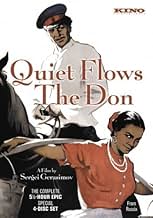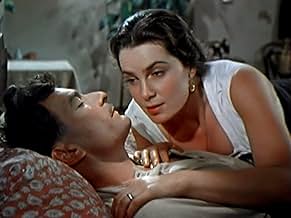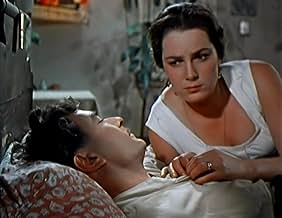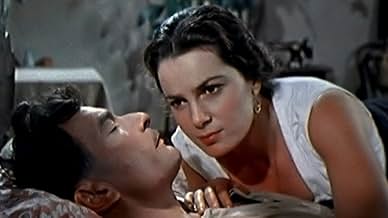AVALIAÇÃO DA IMDb
7,7/10
1,4 mil
SUA AVALIAÇÃO
Adicionar um enredo no seu idiomaAn epic story of shattered lives of the Don Cossacks through chaos of World War I, the Russian Revolution, and the following Civil War.An epic story of shattered lives of the Don Cossacks through chaos of World War I, the Russian Revolution, and the following Civil War.An epic story of shattered lives of the Don Cossacks through chaos of World War I, the Russian Revolution, and the following Civil War.
- Direção
- Roteiristas
- Artistas
- Prêmios
- 1 vitória no total
Daniil Ilchenko
- Panteleimon Prokofyevich Melekhov
- (as D. Ilchenko)
Anastasia Filippova
- Ilyinichna - maty
- (as A. Filippova)
Pyotr Glebov
- Grigoriy Melekhov
- (as P. Glebov)
Nikolai Smirnov
- Pyotr Melekhov
- (as N. Smirnov)
Lyudmila Khityaeva
- Dariya - zhena Melekhova
- (as L. Khityayeva)
Natalya Arkhangelskaya
- Dunyashka Melekhova
- (as N. Arkhangelskaya)
Aleksandr Blagovestov
- Stepan Lekatov
- (as A. Blagovestov)
Elina Bystritskaya
- Aksiniya
- (as E. Bystritskaya)
Aleksandr Zhukov
- Miron Koshevoy
- (as A. Zhukov)
Aleksandra Denisova
- Lukinichna
- (as A. Denisova)
Zinaida Kirienko
- Natalya Melekhova
- (as Z. Kiriyenko)
Boris Novikov
- Mitka Korshunov
- (as B. Novikov)
Aleksandr Karpov
- ded Grishaka
- (as A. Karpov)
Yelena Maksimova
- maty Koshevogo
- (as Ye. Maksimova)
Gennadi Karyakin
- Mikhail Koshevoy
- (as G. Karyakin)
Valentina Khmara
- Mashutka Koshevaya
- (as V. Khmara)
Pyotr Chernov
- Ilya Bunchuk
- (as P. Chernov)
- Direção
- Roteiristas
- Elenco e equipe completos
- Produção, bilheteria e muito mais no IMDbPro
Avaliações em destaque
The film contains 3 parts, each of which is close to 2 hours.
Here are what I like: 1. This film accurately depicted an agricultural society before the industrial revolution. People used oil lamps. Most people were not well educated. There was no sliced bread. You need to slice bread when you eat. People ate potato, bread, drank milk and soup. There were no in-door plumbing.
2. People's psyches were also very typical of a pre-industrial society. Everyone in the Cossack community were Orthodox Christian. The basic moral fiber was well and strong. Multi-generations lived in a large household. Young people were hooked up by marriage brokers. Young people needed family patriarch's blessing before they could marry.
In other words, you would feel people's psyches and the society at large were very much like the Chinese society before China felt the impact of industrial revolution.
I felt very familiar with the characters and their surroundings. In fact, I felt the men and women were so intimate to me, that I felt really strongly about their joy, anxiety, and anguish.
3. Politics was a central theme in this movie. The novel and the film did a great job in depicting the reality of Russia during the tumultuous years of War World I and the Civil War following the Boshevik revolution.
4. Watching the film, I hated the communists who pretended to be pacifists during War World I, and then showed their ugly face by pushing the country into a 3-year long extremely bloody civil war after War World I ended.
5. Overall, the protagonist, Grigory Melekhov, is a freedom loving, traditionalist with a humanist world view. The communists had the inhumane view of class warfare, and were power mongers.
6. It is amazing that the movie makers were able to make the movie without a single brush of communist propaganda. The movie didn't villanize either side. Nor did it promote, or aggrandize either side.
7. I didn't read the novel. It was said that the adaptation to film lost the richness of the novel. On the basis of the film, I'd say the story structure is a very good epic structure.
8. It is a very dramatic and moving story. With a lot of colorful characters, with rich and interesting characterizations.
9. The 4th DVD contains special features. There were an interview with Ellina Bystritskaya who played Aksinya and an interview with Zinaida Kirienko who played Natalya. Both interviews were done in 2002, I believe. They are quite interesting.
Here are what I felt could be better: 10. There is a soap opera feeling to the film. The characters are not very deep.
11. There were many drinking and eating scenes, which became repetitive.
12. The ending is not satisfactory. The novel was originally circulated in 1928, under Stalin's regime. It would have been banned in Soviet Union if it had a satisfactory ending to my taste. So, I really don't expect more.
13. All characters were quick at saying negative things, and none were good at saying positive things.
Here are what I like: 1. This film accurately depicted an agricultural society before the industrial revolution. People used oil lamps. Most people were not well educated. There was no sliced bread. You need to slice bread when you eat. People ate potato, bread, drank milk and soup. There were no in-door plumbing.
2. People's psyches were also very typical of a pre-industrial society. Everyone in the Cossack community were Orthodox Christian. The basic moral fiber was well and strong. Multi-generations lived in a large household. Young people were hooked up by marriage brokers. Young people needed family patriarch's blessing before they could marry.
In other words, you would feel people's psyches and the society at large were very much like the Chinese society before China felt the impact of industrial revolution.
I felt very familiar with the characters and their surroundings. In fact, I felt the men and women were so intimate to me, that I felt really strongly about their joy, anxiety, and anguish.
3. Politics was a central theme in this movie. The novel and the film did a great job in depicting the reality of Russia during the tumultuous years of War World I and the Civil War following the Boshevik revolution.
4. Watching the film, I hated the communists who pretended to be pacifists during War World I, and then showed their ugly face by pushing the country into a 3-year long extremely bloody civil war after War World I ended.
5. Overall, the protagonist, Grigory Melekhov, is a freedom loving, traditionalist with a humanist world view. The communists had the inhumane view of class warfare, and were power mongers.
6. It is amazing that the movie makers were able to make the movie without a single brush of communist propaganda. The movie didn't villanize either side. Nor did it promote, or aggrandize either side.
7. I didn't read the novel. It was said that the adaptation to film lost the richness of the novel. On the basis of the film, I'd say the story structure is a very good epic structure.
8. It is a very dramatic and moving story. With a lot of colorful characters, with rich and interesting characterizations.
9. The 4th DVD contains special features. There were an interview with Ellina Bystritskaya who played Aksinya and an interview with Zinaida Kirienko who played Natalya. Both interviews were done in 2002, I believe. They are quite interesting.
Here are what I felt could be better: 10. There is a soap opera feeling to the film. The characters are not very deep.
11. There were many drinking and eating scenes, which became repetitive.
12. The ending is not satisfactory. The novel was originally circulated in 1928, under Stalin's regime. It would have been banned in Soviet Union if it had a satisfactory ending to my taste. So, I really don't expect more.
13. All characters were quick at saying negative things, and none were good at saying positive things.
Beautiful film and well-acted in a theatrical style that is common of many older Russian films. The story is long and involved, and an American audience will likely wonder what the point of the first 1/3 of the movie is about. As described by another, that portion of the film seems very much like a soap opera concerned with who is sleeping with whom. More importantly is how the scandal plays out in the families and village and how the characters are trapped within their lives, culture, communities, and expectations.
Americans and other westerners might also be surprised by the 2nd part of the film, which depicts the Bolshevik victory as far from certain, often challenged, with parties changing sides and allegiances as the war weary citizens fight on through tragedy after tragedy.
Overall, it's a brilliant film ... a technical and cinematic achievement, for sure. Comparisons to "Gone with the Wind" are entirely appropriate .. however, it is a "Gone with the Wind" with muscles, with combat, with blood, with real tragedy.
Americans and other westerners might also be surprised by the 2nd part of the film, which depicts the Bolshevik victory as far from certain, often challenged, with parties changing sides and allegiances as the war weary citizens fight on through tragedy after tragedy.
Overall, it's a brilliant film ... a technical and cinematic achievement, for sure. Comparisons to "Gone with the Wind" are entirely appropriate .. however, it is a "Gone with the Wind" with muscles, with combat, with blood, with real tragedy.
This is one of those movies which would haunt you again and again after you watched it once. And more over -- the more you watch it the more you find something new about yourself,people and life. Thikhiy Don depicts life of two -- man and woman, their love, their hardships, their fight for their love and all this happens against the backdrop of a wide picture of life of the whole country during a very dramatical and crucial period of Russia, including WW1, civilian war,and a lot of others events. I don't know another movie where love was depicted so sincerely and so nicely as it was done here. Petr Glebov and Elina Bystritskaya not played they lived on the screen, as did the love of their heroes. The movie turned out to be very realistic, with big respect for details. Before the movie was set out actors lived several months at the khutor where events of the book really took place. A lot of beautiful Russian actors performed in this movie, each performance is a little masterpiece. The music was written by Yuriy Levitin, one of the best follower of Shostakovitch and it matches the movie very well. The director did a superb job, there are no details missed in this movie, all was in check by director, even the river itself which gave the name to the whole thing was one of the actors -- Don i mean. In my opinion it is one of the best movie made in the 20 th century. Some people could compare it with 'Gone with the wind'but i appreciate it much higher. I rate it 10.
This is a 6 hour flick of three episodes.
1 Pre WW1, the way of life,the lives and loves
of the rural Cossack village.
2 Mobilization, WW1, defeat
3 The end of WW1, revolution,chaos, civil war, changing fortunes, Bolshevik Victory. The turbulence of Cossack life during this time.A bit of propaganda,but who cares?
This is the Russian Gone With the Wind.As good and maybe better. A vanished world. I had
seen it before,but this adaptation was better.Maybe the other was edited different or the subtitles are better? The flow of the story was better.Several characters from the home village appear again and again during the film. The main character is Grigory, a young rather wild Cossack, his next door married lover, his family selected wife.His large family gets a lot of time in this.A rather boring life is soon interrupted by war,revolution,counter revolution , Bolsheviks, white Russians,bandits and Communists. As things change, Grigory switches sides, his family and the Cossacks way of life is ruined. He loses everything. Well filmed,well acted,excellently scored, a cast of thousands.A classic Russian epic. Well worth watching. Epic War, history and love.You can't beat the combination.
There's something about Russian films made around this time which are simply brilliant. 6 hours pass very quickly. Pure Genius
Você sabia?
- CuriosidadesOriginal Russian film is 340 minutes long (film length 9,582 m). It was reduced to 107 minutes for international distribution.
- ConexõesFeatured in Zhizn odna... (1987)
Principais escolhas
Faça login para avaliar e ver a lista de recomendações personalizadas
- How long is Quiet Flows the Don?Fornecido pela Alexa
Detalhes
- Tempo de duração
- 5 h 30 min(330 min)
- Mixagem de som
- Proporção
- 1.37 : 1
Contribua para esta página
Sugerir uma alteração ou adicionar conteúdo ausente



























